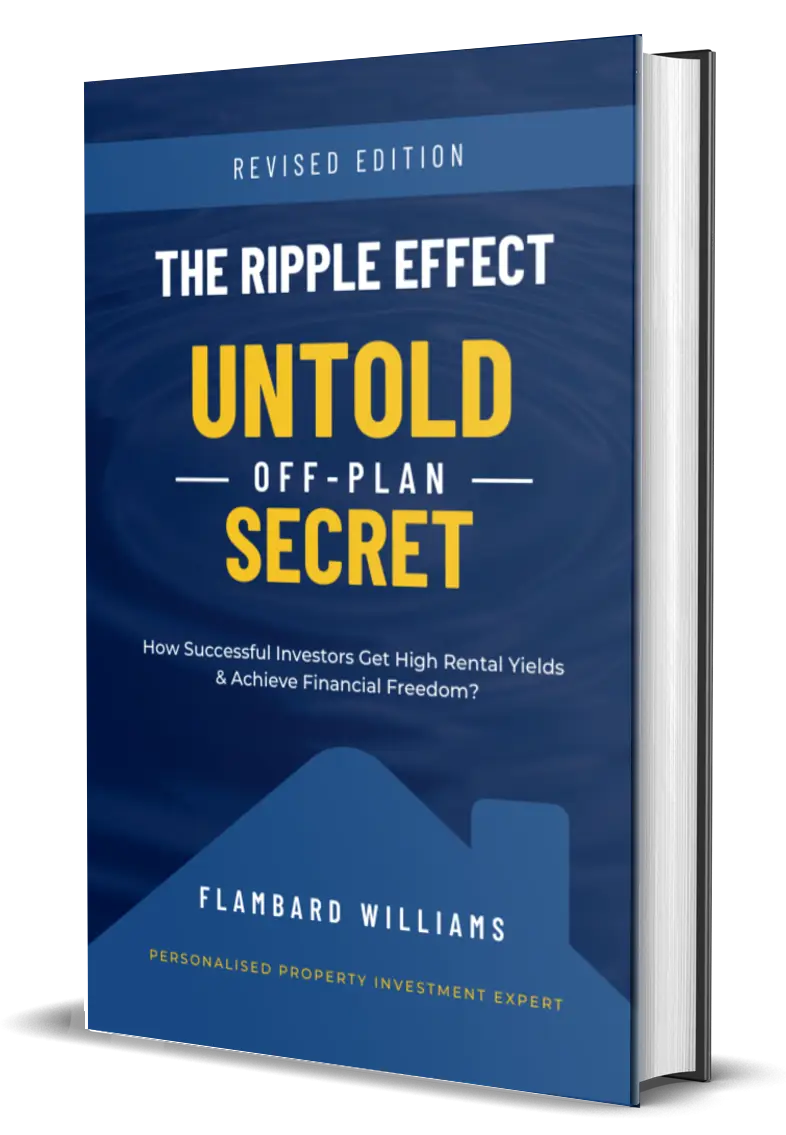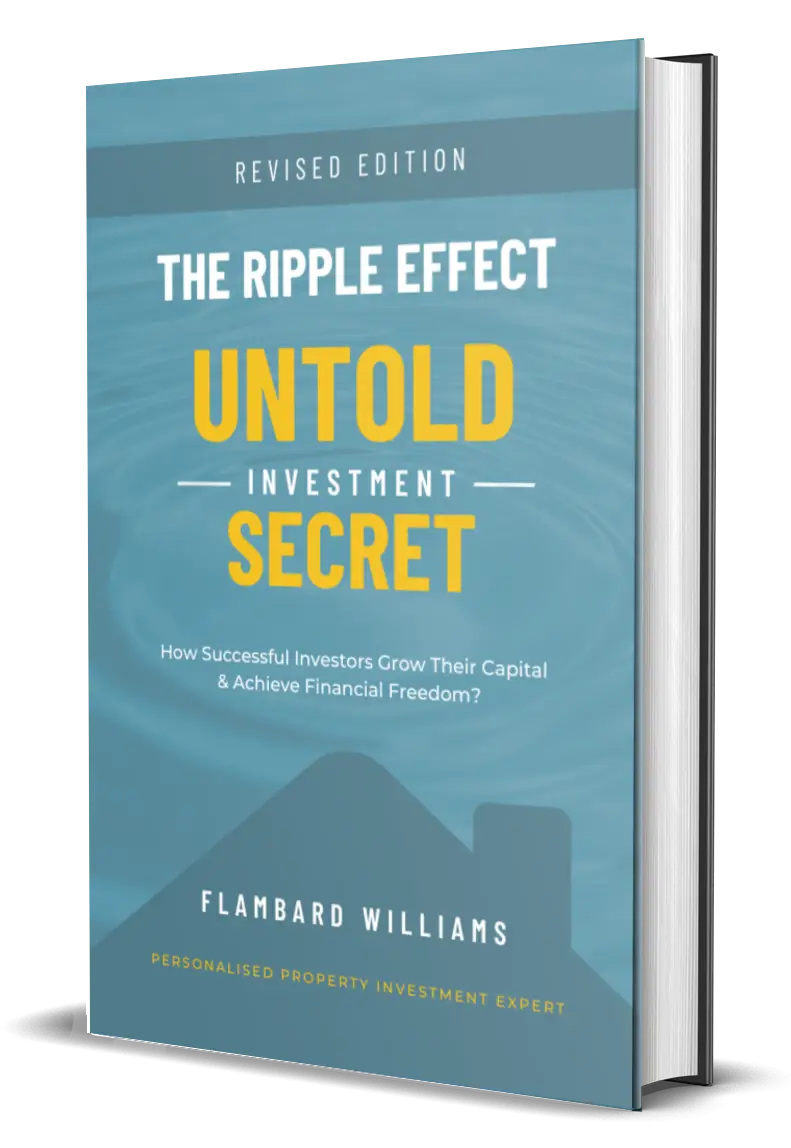Mortgage Broker’s Advice for 2023 – Interview with Ashley Morley
As the new year approaches, we understand that a number of property investors are wondering what is really going on in the current mortgage market, and what this means for the buy-to-let market going into 2023.
We caught up with our in-house mortgage broker and industry expert, Ashley Morley, to give you the latest information, news, tips and tricks, along with answers to our frequently asked questions.
What is included in the services you offer?
Ashley: My first call with a client is called “Know Your Client”. I will introduce myself and explain who I am and how I work with Flambard Williams. I will then ask them what they are after in the property space. I really want to understand what the client’s goals are and how I can help them achieve these.
Some people are looking to move quickly and invest in multiple properties, whereas others are more risk averse and want to build their portfolio gradually. I try to gain as much information as possible from the initial introductory call.
At this point I will do a full fact find to make sure I have all their details. After the call I am able to assess what the client wants to do. I research for them to find them the best options available on the market. Depending on the client, it could be as simple as investing in a property that is already up for sale, or exploring new developments that are being built over the next few years. If possible, I will try to quote on the call. If not, I will get back to them within 24 hours after I have conducted my research.
I will then send a full application pack to them, so that they can make sure they have all the relevant documentation such as ID and bank statements. I will then set up a follow up call to make sure all the details they have provided are correct and that they are happy for me to proceed and do the decision in principle document. At this point the credit search is done. Because a lot of the lenders now do soft footprint credit searches, so it won’t affect their credit score as much. But it does give the client an indication if the lender is likely to lend.
After the credit check, I will proceed with the full application package. This is usually completed within 24 hours depending on whether the client can supply the documentation and be available on the phone.
“I try to be as efficient as possible in my processes. When I’m filing an application I will spend more time researching than I will submitting the case. I do this to reduce the chances of any hiccups along the way.”
Once the application is submitted to the lender, I will call the lender to make sure the application has been received and is all present. I will then inform the client what the lenders turn around times are, this is usually between 1-5 working days, I will be in contact again when I hear feedback. The lender may come back to me to ask questions, but I will know the client well enough to answer any of these questions on their behalf. I try not to bombard them with questions if I don’t need to!
Valuation may come before or after the application is submitted depending on the lender. Once this comes back and it is good, we will go straight to the offer. If it is a down valuation, then we need to have a discussion and find another option.
Do Our Clients Have to Go Through a Specialist Lender?
Ashley: Specialist lenders think completely differently to high street lenders. They don’t try to compete with the high street, but instead see what they are doing and try to fill a gap within the market – this is why their interest rates are higher.
If you already own one buy-to-let property and your own home and have a comfortable income, then you are more likely to be accepted by a high street lender when you want to buy a property on a residential street or a flat in a block that is aimed at both investors and occupiers. This is because they have lower interest rates and therefore lower margins. The volume of applications they receive is high so a computer will approve or deny your request, there usually isn’t any human involvement.
However, maybe you are in a different kind of situation where there is more of a risk to the lender. For example, you are a first time landlord or you don’t own the property you currently live in. In this case you need to go to a specialist lender because the underwriting process is a human approach. This way a person can verify if it all makes sense from a financial point of view and they are willing to lend, even if it is more of a risk. This will be reflected in the interest rate.
So no, you don’t need to use a specialist lender, however, if you plan to invest in an investment-heavy block of flats, for example, then I would go with a more specialist lender because they will understand the type of property and know that it is an investment-heavy area.
“The main problem I find is that some investors are attracted by low interest rates on the high street and submit an application before getting advice. If they don’t fit the lender’s criteria they will lose both time and money when it is denied.”
So, even if interest rates are higher with specialist lenders you will not go through the pain of an application being rejected.
How Do You Ensure Overseas Clients Are Supported?
Ashley: The overseas process is very similar to the UK process, but more in depth. A lot of lending in the UK is based on credit score, as you can search somebody and see if they have had debt in the past and if they have paid this off on time. If they pay back on time, they are less of a risk to lend to. As a foreign national, you don’t have a UK credit score. As a result, first time overseas UK property investors have to take much higher interest rates to get in the market.
The biggest thing I say to overseas clients is that they need to understand their statement of wealth. This asks them how they built up their wealth. Sometimes it can seem a bit intrusive asking how a client procures their wealth, but it’s really important in order to ensure the client gets the mortgage. Lenders don’t like to be seen taking a risk if they cannot prove that the investment is not coming from money laundering or fraud. For example, if the proof of deposit was existing savings that had been built up for 10 years, then they need to be able to see at least 1 bank statement from each year showing that it is building up.
It’s important that I go into as much detail as possible with overseas clients, and I put myself in the shoes of a lender and ask, would I lend this money to this person? It can feel intrusive but it’s the only way to ensure that overseas clients can secure a mortgage. This allows me to answer any questions lenders may have. For example, if a large sum of money was taken from the client’s account on a certain day, why was that? Was it another overseas investment?
For overseas investors the process will be longer. All the documents need to be checked thoroughly and due to time differences it can take longer to relay information. For example, I was talking to a client in Australia and I was asleep when he was awake and vice versa, which meant that the application took much longer than a UK application.
I try my utmost to keep clients updated regularly at each stage. I myself have invested in property and know how frustrating it can be waiting 2-3 weeks for any updates. I just have to be mindful that it will take longer to complete because of the thorough checks on all their documents.
What Have You Seen in The Mortgage Market Lately?
Ashley: At this current point in time we are seeing a slight decrease in rates. This is positive because previously the rates were increasing every single day. This is bringing some stability and much needed confidence to the market.
The main issues we were having were the increasing swap rates. When Liz Truss released the mini-budget, the confidence in the market dropped and those rates and the rate of borrowing went through the roof quickly and the banks had to draw their products straight away.
This is because lenders only draw down on the money on completion, this can take 3-6 months, and in this time the rate to borrow can increase above what they were offering the customer. They then had to withdraw fixed interest rates because they couldn’t anticipate how much it was going to cost to borrow and they couldn’t risk making a loss.
I am quoting about 5.5% for a 5 year fix at the moment, but I was quoting about 6.5% a few months ago. So there is some stability returning. I don’t expect rates to drop in the next few months and the start of 2023. This is because the banks have already hit their targets and don’t need to lend money to people they think might be a risk just to meet targets.
I am very busy at the moment for this exact reason. A landlord I am working with knocked a property down below market value, it was on the market for £325,000 and above, the client got it for £312,000 purely because the seller wanted to find a buyer before Christmas.
“There has been a 10 year cycle where property went up and back down. The pandemic has definitely changed the dynamic of this cycle. We have seen in the past that if prices do go down, they will always rebound in the future. Sometimes buying at the stereotypically ‘wrong’ time is actually the best course of action.”
When I speak to my clients or any new prospects, if they are a bit worried, I recommend that they think outside the box and that’s how they can make their money. Gone are the days where you could buy a cheap buy-to-let and rent it out, then 2 years later sell it as the property has gone up in price.
I have been dealing with landlords for over 7 years now, and they will buy at the “worst times” on purpose. For example, If we go back to when Brexit was announced, many landlords used this as an opportunity to knock tens of thousands off of property prices.
“Being an investor is all about thinking differently.”
This presents a perfect opportunity now for landlords to invest as we are entering a tough economic winter. If there are foreign investors out there, this is the time to buy. However, good times will return and therefore any leverage you may have would reduce.
What Do You Anticipate 2023 Mortgage Rates Will Be?
Ashley: At the beginning of next year I’m expecting a bit more competition. It’s all about who will be the first to reduce their rates and the rest will follow. There’s something called a rental calculation which is used in buy to let at the moment and that determines how much money you can borrow depending on the rent. This is normally based on the interest rate or around that figure. It used to be 5.5% for a 2 year fixed. However, interest rates have increased and have gone over 5.5%.
A lot of the rental calculations are now a lot higher than they used to be 2 to 5 years ago. Some people are coming back to the market and trying to borrow but are now not in a position to do so. This means we will see some movement from the lenders.
We are seeing a lot more, lower interest rates to help the rental calculation, but higher arrangement fees to make sure they cover their risk. Some lenders do something called top slicing where they can take part of your income and use that towards the deficit of the rental.
“I am hoping to see rates begin to reduce at the end of Q1 and then return to a ‘new normal’ level.”
The rates will never return back to previous levels. The 1-2% interest rates are a thing of the past unfortunately. My educated guess is the High Street lenders will be around 3-4.5% and the specialists will be around 4-5.5%. I don’t think we will see this until the end of next year but this will be a decrease so it is positive.
Are There Any Particular Lenders That Are Unlikely to Lend?
Ashley: High street lenders, such as Lloyds, will see that a particular block of flats has been heavily invested in and they will decline any application for a loan. So the high street lenders are a no-go area.
It’s a game of risk. The high street lenders do not want to lend if they think it will be a risk and give out low interest rates. For example, If I was given a new block of flats, the temptation would be to go to a high street lender for the first few applications and see what their views are. If they come back with the green light then it’s a perfect opportunity.
The most important part for them is, “how do we get our money back”. If the customer defaults on their mortgage payment the lender is losing money, they will want to sell the property as quickly as possible. To do this they need to be able to sell to everyone. If they have a flat which is in an investment-heavy area, the chances are only investors will buy. This reduces the pool of buyers and in turn will reduce the value for a quick sale. This is why most high street lenders won’t consider anything which has issues on “future saleability”
What do I need to prepare in order to get the best mortgage rates?
Ashley: If you are a UK citizen, you can do certain things to make yourself more attractive to the High Street lenders, like having a comfortable income etc, but this might not have a massive effect. The best thing to do is to make sure that all your paperwork is in order. This includes a form of ID, Proof of address, 3 months of previous bank statements. UK citizens should be fine.
Another important factor is your credit score. If you have any outstanding payments you will struggle to attract the best rates on the high street. If you need to sort this, speak with a broker to see how you can build up your credit score.
It’s a myth when people say that if you don’t have any credit, your score will be good. Actually, it can be bad. Lenders will do two things, a credit search and a credit score. A credit search is looking for missed payments, a credit score is looking at the overall score. If you have no credit, lenders won’t be able to see if you can keep up with mortgage repayments. I understand why lenders would take this view. If you look at 2 people, one with zero credit and one with a lot of credit that has never missed a payment, you can see who has a proven track record.
One way of improving your score is to get a small credit card, use it to pay for food and petrol. Make sure you pay the balance off in full every month! This will then prove to the lenders you can get in debt and pay it off.
Another key aspect is the actual usage of your credit. If you had 1 or 2 credit cards and used 80-90% of these out of an £1000 limit, then it shows lenders that you actually need all the credit. Whereas if you had 5 or 6 credit cards and used 20%, then it will show the system that you have quite a bit of unused credit. It looks to lenders that someone who uses 80-90% of the credit really needs this money, so they are a less attractive prospect. However I am not advising clients to go out and get multiple credit cards, just be aware of your credit limit and usage.
In terms of overseas, it’s all about the statement of wealth. They want to know where all your money has come from. If it’s as simple as you sold a property or gained inheritance, we can get a document from your solicitor to prove that you sold a property or gained inheritance. Any money that cannot be accounted for can cause an issue. It’s important to remember that if you are overseas, it is very hard to get the best rates just because you are overseas. In that case, you will need a more specialist lender.
For more information, or to speak to one of our property specialists, get in touch today. We will be happy to answer any questions you may have, and provide you with expert advice to help you reach your property goals.





















 Exclusive Property Launch Invitations
Exclusive Property Launch Invitations Customised Market Reports
Customised Market Reports Exclusive Access to Off-Market Properties
Exclusive Access to Off-Market Properties Networking Events
Networking Events





